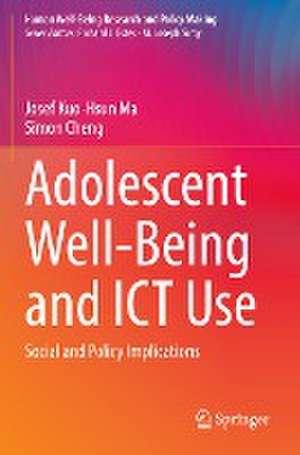Adolescent Well-Being and ICT Use: Social and Policy Implications: Human Well-Being Research and Policy Making
Autor Josef Kuo-Hsun Ma, Simon Chengen Limba Engleză Paperback – 22 mai 2023
| Toate formatele și edițiile | Preț | Express |
|---|---|---|
| Paperback (1) | 1028.99 lei 6-8 săpt. | |
| Springer International Publishing – 22 mai 2023 | 1028.99 lei 6-8 săpt. | |
| Hardback (1) | 1034.46 lei 3-5 săpt. | |
| Springer International Publishing – 21 mai 2022 | 1034.46 lei 3-5 săpt. |
Preț: 1028.99 lei
Preț vechi: 1083.15 lei
-5% Nou
Puncte Express: 1543
Preț estimativ în valută:
196.89€ • 206.13$ • 162.92£
196.89€ • 206.13$ • 162.92£
Carte tipărită la comandă
Livrare economică 05-19 aprilie
Preluare comenzi: 021 569.72.76
Specificații
ISBN-13: 9783031044144
ISBN-10: 3031044142
Pagini: 229
Ilustrații: XXIII, 229 p. 82 illus., 80 illus. in color.
Dimensiuni: 155 x 235 mm
Greutate: 0.36 kg
Ediția:1st ed. 2022
Editura: Springer International Publishing
Colecția Springer
Seria Human Well-Being Research and Policy Making
Locul publicării:Cham, Switzerland
ISBN-10: 3031044142
Pagini: 229
Ilustrații: XXIII, 229 p. 82 illus., 80 illus. in color.
Dimensiuni: 155 x 235 mm
Greutate: 0.36 kg
Ediția:1st ed. 2022
Editura: Springer International Publishing
Colecția Springer
Seria Human Well-Being Research and Policy Making
Locul publicării:Cham, Switzerland
Cuprins
Chapter 1. Introduction: Digital divide from differentiated access to differentiated use.- Chapter 2. The influence of ICT use on students’ well-beings.- Chapter 3. The second digital divide among schools.- Chapter 4. The second digital divide between rich and poor students.- Chapter 5. The second digital divide between male and female students.- Chapter 6. The second digital divide from a more global perspective.- Chapter 7. Conclusion.
Notă biografică
Josef Ma is Assistant Professor at the Department of Sociology, National Taipei University, Taiwan. Much of his scholarship centers on how macro-structural forces like human capital investment and income inequality influence the role of digital technology and the life chances of adolescents. Using a life-course perspective, he is also interested in examining a wide range of youth outcomes in the transition to adulthood, such as online behaviors, fertility intentions, and sexual relationships. Ma’s research on related topics has appeared in Social Indicators Research, International Journal of Comparative Sociology, and International Sociology.
Simon Cheng is Professor of Sociology at the University of Connecticut, USA, where he has been teaching since 2004. His teaching and research interests are: the sociology of education, family, race/ethnicity, sexuality, and quantitative methods. Cheng’s publications in these areas include articles in AmericanJournal of Sociology, American Sociological Review, Social Forces, Social Science Research, Sociological Methods & Research, and other journals.
Textul de pe ultima copertă
In this book, the authors expertly examine the issue of adolescent well-being in the light of their exposure to and use of information and communication technologies (ICTs) at school and home. The authors discuss a new form of inequality especially noticeable among youth, which is, digital inequality/divide, created through rapid developments in ICT. They analyze the relation between digital divide and educational inequality among youth, describe patterns of social exclusion from technology and education, and discuss related policies in industrialized nations to see how well-being issues can be addressed in this context. Comparing results based on nationally representative and internationally comparative datasets across 28 countries, the authors ask how and why the benefits accruing from ICT are substantially greater for some adolescents, but apparently smaller for others and how such differences may be reduced. They provide policy suggestions that are broadly based in the fields ofwell-being, secondary education, and technology use. This book is of interest to researchers and students of quality of life and well-being studies and a wide range of social science and education disciplines, including the sociology of education, media sociology, sociology of childhood and adolescence, communication studies, and science and technology education.
Caracteristici
Points to the important lesson that the effect of ICT use is heterogeneous Compares patterns of digital divide in secondary education across 27 industrialized countries Provides policy recommendation based on empirical research with large-scale, representative and cross-national datasets













